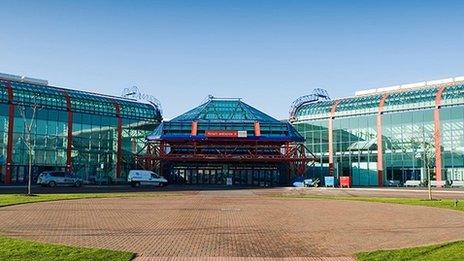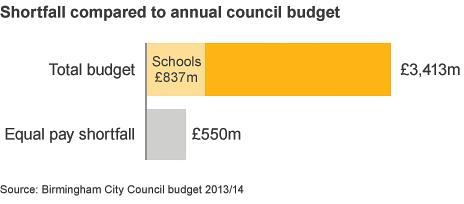Birmingham landmarks including the NEC could be sold off
- Published
- comments

The NEC could be worth "as little as £300m", one finance expert has said
Landmarks such as the NEC could be sold to pay legal claims over equal pay totalling more than £1bn, Birmingham City Council has said.
The council has agreed settlements with thousands of women who were paid less than workers - mainly men - who did equivalent jobs.
One law firm is said to be dealing with 4,000 outstanding cases.
Council leader Sir Albert Bore said no decision had been taken on any sales - but admitted it was "a possibility".
The council has already paid out nearly £500m after being allowed to borrow the money but the Department of Communities and Local Government will not allow it to borrow any more, leaving a shortfall of £550m.
A council spokesman said the authority had assets of about £5bn, and they "continually review all assets within our portfolio to ensure that the best value is obtained for the taxpayer".
Those assets include the NEC group - the National Exhibition Centre, the LG Arena, the National Indoor Arena (NIA) and the International Convention Centre.
A confidential report was circulated among councillors asking them to consider various options, BBC correspondent Phil Mackie said.
"The council remains guarded about how quickly it needs to pay the claims, and which buildings will be offered for sale," he said.
"It doesn't want to create the impression that its hand is being forced and that it's holding a fire sale."

Council leader Sir Albert Bore said the NEC needed "serious investment" so the authority was "looking at the possibility of different ownership that could encourage investment in its infrastructure".
"The council does have freehold ownership of the NEC, NIA and ICC so we could give up part or all of that ownership.
"It's all in the melting pot but not decision will be made for quite a while," he added.
Gillian Whittaker from the GMB Union tells 5 live: 'This money is money they should have been paid'
Sir Albert said the council would meet on Saturday to discuss its budget but councillors would not be talking about the selling of assets.
Gillian Whittaker from the GMB Union, who helped to negotiate the settlements, said: "Some of our members are very, very low paid and they should have been receiving this money over the years anyway.
"There is an opportunity to lease some of these properties so they remain within the council... If they have to sell properties then that is a decision they have to make."
'Only worth £300m'
The Labour MP for Birmingham Edgbaston, Gisela Stuart, said selling assets to pay the bill was the only available option left.
"If you were the leader of Birmingham City Council at this point you have inherited a legacy of a huge legal bill, you're facing financial cuts, you're facing a situation where some of your basic services can no longer be delivered because of the funding formula.
"I think with a very heavy heart you face up to the fact that you're caught between a rock and a hard place, you get the best deal to settle what was a liability that should not have occurred."
Richard Taffler, professor of finance at Warwick Business School, said the process of valuing assets such as the NEC was done by predicting the future revenue and taking away the running costs.
"But it's not as straightforward as that because then you have to discount back to the present, because owing to inflation, £1 is worth less in the future than it is now," he said.
The trouble with valuing a venue such as the NEC, he added, is the uncertainty of its future performance and the amount of investment needed to make it profitable.
"[Birmingham City] council hasn't released a financial appraisal and estimate yet, but it's likely the NEC is probably only worth £300m.
"It is not especially cash-generative."
Chris Benson, from law firm Leigh Day, represented women who are taking equal pay claims against Birmingham City Council.
He said there were a number of ways in which Birmingham could have avoided a £1bn bill.
"They could have settled with the workers they underpaid instead of paying London lawyers to defend the indefensible for two years," he said.
"They could, of course, have paid the women fairly at the time, as other councils did.
"Instead they are now left with so much to pay as they owe these women many years of wages, with interest on top."
The figures being claimed range from "the low thousands" to more than £100,000 for some full-time workers.
- Published29 January 2013
- Published12 November 2012
- Published24 October 2012
- Published24 October 2012
- Published24 October 2012
- Published10 January 2012
- Published29 November 2011
- Published9 May 2011
- Published21 September 2010